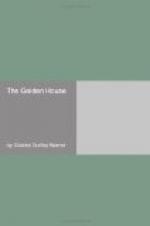With Edith went one of her Baltimore cousins, a young kindergarten teacher of fine intelligence and sympathetic manner, who brought to her work a long tradition of gentle breeding and gayety and simplicity —qualities which all children are sure to recognize. What a hopeful thing it is, by-the-way, in the world, that all conditions of people know a lady at sight! Jack found the place delightful. He liked its quaintness, the primitiveness of the farmer-fisherman neighbors, he liked the sea. And then he could run up to the city any morning and back at night. He spent the summer with Edith at the Golden House. This was his theory. When he went to town in the morning he expected to return at night. But often he telegraphed in the afternoon that he was detained by business; he had to see Henderson, or Mavick was over from Washington. Occasionally, but not often, he missed the train. He had too keen a sense of the ridiculous to miss the train often. When he was detained over for two or three days, or the better part of the week, he wrote Edith dashing, hurried letters, speaking of ever so many places he had been to and ever so many people he had seen—yes, Carmen and Miss Tavish and everybody who was in town, and he did not say too much about the hot city and its discomforts.
Henderson’s affairs kept him in town, Miss Tavish still postponed Bar Harbor, and Carmen willingly remained. She knew the comfort of a big New York house when the season is over, when no social duties are required, and one is at leisure to lounge about in cool costumes, to read or dream, to open the windows at night for the salt breeze from the bay, to take little excursions by boat or rail, to dine al fresco in the garden of some semi-foreign hotel, to taste the unconventional pleasures of the town, as if one were in some foreign city. She used to say that New York in matting and hollands was almost as nice as Buda-Pesth. These were really summer nights, operatic sorts of nights, with music floating in the air, gay groups in the streets, a stage imitation of nature in the squares with the thick foliage and the heavy shadows cast on the asphalt by the electric lights, the brilliant shops, the nonsense of the summer theatres, where no one expected anything, and no one was disappointed, the general air of enjoyment, and the suggestion of intrigue. Sometimes, when Mavick was over, a party was made up for the East Side, to see the foreign costumes, the picturesque street markets, the dime museums, and the serious, tragical theatres of the people. The East Side was left pretty much to itself, now that the winter philanthropists had gone away, and was enjoying its summer nights and its irresponsible poverty.




